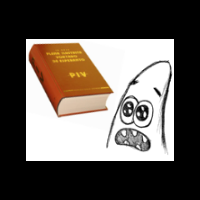Why the apostrophe?
ElNokto, 2007 m. rugpjūtis 22 d.
Žinutės: 11
Kalba: English
ElNokto (Rodyti profilį) 2007 m. rugpjūtis 22 d. 02:20:22
-ExNoctem
Rao (Rodyti profilį) 2007 m. rugpjūtis 22 d. 02:32:49
The apostrophe is used mainly in poetry, for instance when one has to shorten a verse. Personally, if it's not for amusement, I think it's very pedantic to use it often in everyday talk, unless in those interjection and onomatopoeia cases like fek', paf', etc.
(Sorry for poor grammar, English is not my native language)
Espi (Rodyti profilį) 2007 m. rugpjūtis 22 d. 07:13:46
ElNokto:Ever since I learned an apostrophe could be used to eliminate certain extraneous vowels, I have been on the lookout for anyone who uses it. It occured to me that I had seen it on lernu a few months ago: on the list of swear words. The apostrophe is on the end of fek', which makes me believe it is eliminating an "o" at the end. Any ideas? Thanks in advance.Hello, ElNokto!
-ExNoctem
In Esperanto the apostrophe only substitutes the "-o" of nouns and the "-a" of the article "la".
Are you seeing paf', konstru' etc., that means the radical of an Esperanto-word. You only have to add the desired ending (-a, -e, -i, -as, etc.) > pafo, konstrui, etc.
Greetings
Espi
licx (Rodyti profilį) 2007 m. rugpjūtis 22 d. 14:14:08
But it's also often used in music, like in this song of Persone:
Jen mi iras sub la ĉiel’
Nokte nigra, nenie estas stel’
For Alkoro kaj for Mizar’
For la Granda Ursin’
De l’ momento kiam mi vidis vin
Mi navigas sen la stelar’
ElNokto (Rodyti profilį) 2007 m. rugpjūtis 22 d. 20:26:45
-ElNokto
P.S.: Sorry for posting ExNoctem after my last few posts... ElNokto is the E-o transliteration of my usual username (Wikipedia, email, Dist.Proofreaders, etc.)
piteredfan (Rodyti profilį) 2007 m. rugpjūtis 23 d. 01:24:55
ElNokto:Thanks all for the input, but maybe I should clarify my question: why does fek' specifically have an apostrophe after it, or should it even have one at all?"Fek'" is "feko", faeces or shit. "Feko" the noun, and "fek'" the interjection. I think "fek!" would be correct also.
-ElNokto
P.S.: Sorry for posting ExNoctem after my last few posts... ElNokto is the E-o transliteration of my usual username (Wikipedia, email, Dist.Proofreaders, etc.)
mnlg (Rodyti profilį) 2007 m. rugpjūtis 23 d. 02:15:37
Espi:Are you seeing paf', konstru' etc., that means the radical of an Esperanto-word. You only have to add the desired ending (-a, -e, -i, -as, etc.) > pafo, konstrui, etc.This is not correct. If you see "paf'", this can only mean pafo; "konstru'" can only be konstruo (it cannot even be konstruon).
Espi (Rodyti profilį) 2007 m. rugpjūtis 23 d. 05:36:42
mnlg:Hi, mnlg!Espi:Are you seeing paf', konstru' etc., that means the radical of an Esperanto-word. You only have to add the desired ending (-a, -e, -i, -as, etc.) > pafo, konstrui, etc.This is not correct. If you see "paf'", this can only mean pafo; "konstru'" can only be konstruo (it cannot even be konstruon).
I agree with you.
I've meant: paf', konstru' etc. you find in dictionaries - as radicals (such as in the "Fundamento de E-o").
Mostly is written: paf-, konstru- etc., which I prefere.
But in texts it means: pafo, kunstruo etc. That's right!
Amike

Espi
hulten (Rodyti profilį) 2007 m. rugpjūtis 25 d. 12:45:40
mnlg:This is not correct. If you see "paf'", this can only mean pafo; "konstru'" can only be konstruo (it cannot even be konstruon).So, that would mean that the apostrophe is used instead of the -o, exactly that and nothing else?
I wondered about the use of the apostrophe in fek' also, so my question is the same as ElNokto's. I did not see a convincing answer yet.
I thought fek' was derived from feke instead of feko. I understand that the meaning of fek' is "shit", a substantive, but it sounds more like "fuck". Probably that word isn't used, because it is too offensive.
Anyway, I thought that the (kind of) rational reason for "fek'" in stead of "feko" or "feke" was that it is easier to shout a word which has only one syllable.
Marco
erinja (Rodyti profilį) 2007 m. rugpjūtis 25 d. 13:32:35
"fek" sounds like the well-known English profanity but isn't, as already mentioned; that Esperanto word is "fiki" (and is used in its well-known verb sense, but is not normally shortened to "fik" or used as an interjection)
And a little sidenote here, for anyone who doesn't know; "fiki" is profane in any context. "Feki" is used as a profanity but it is actually the correct word for "to defecate", as well. You could say a sentence like "Mi longe restis en la necesejo ĉar mi devis feki" and that would be perfectly fine and not profane at all.





